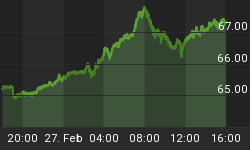The data has started to arrive.
Tuesday's Employment report (gosh, it seems strange to write that) was weaker-than-expected with Payrolls +148k versus expectations for +180k. As I wrote back at the beginning of August, something in the realm of 200k is about as good as you're going to get, so we're not very short of that...we're just very far short of what the consensus seems to expect we're eventually going to get. No doubt, 148k isn't 200k, and the six-month average of 163k is the lowest of the year. But it is also not a calamity, on the growth front.
And yet, 10-year interest rates are 50bps below the highs of early September. (Real yields are actually down 60bps, which means inflation expectations have risen slightly during that period). Interest rates are down because everyone knows that the trajectory of policy, with Yellen as likely to be the next Chairman of the Fed, is going to be "lower for longer." But why? This goes back to the observation that growth is not far short of the best that it is likely to get. The only point of "lower for longer" is to support asset markets - housing, equity, and the bond market whence our nation's interest burden is determined - and it seems to be doing this quite well. The alternate theory is that the Fed still fears deflation, despite all evidence (and copious theory) that the risk arrow is pointing in the other direction. In neither case does the Federal Reserve come out looking particularly on top of things, but more and more we are expecting that from Washington whether the officials are elected or appointed.
I really thought at one point that the bond market was going to be where the profligate monetary policy was going to first come unglued, but I am now wondering if it isn't that denizen of hair-trigger shooters, the foreign exchange markets. The dollar index is plumbing the lows of the last two years, although it remains considerably above the lows of 2008 and 2011. As the chart below shows, the dollar has actually left behind the commodity markets where, as we know, investors suffer from the delusion that growth is more important for the nominal price of commodities than is the overall price level. Weak-ish growth means that commodities are only weakly above its August lows, although the buck is quite a bit lower since then.

I don't think we can learn much right now watching stocks, where investors are simply playing Icarus. We all know where it leads, but any words of warning are laughed off as they soar with Fed-induced wings. Of course they'll turn away in time!
I think housing is interesting. Having gotten back barely to fair, or maybe just a smidge cheap, compared to incomes, housing is expensive once again. But it isn't in bubble territory yet, at least in the sense that when it cracks it could cause the carnage it did once before.
Bonds are on tenuous footing. With the consensus currently in place that the Fed might keep QE in place more or less forever, there are a lot of ways to disappoint the status quo: Fed speakers might suddenly try to start sounding stern again and imply that QE might not last forever; inflation might continue to tick higher and make obvious the unsustainability of the current course; or growth numbers might surprise to the high side.
The barbarians are already overrunning the dollar, and I suspect only the fact that Japanese monetary policy is far worse is keeping the descent slow. But people plugged into the supply and demand for currency are probably most likely to understand what happens when too much is supplied (hint: it's the same thing that happens to the price of corn when too much corn is supplied). For a while, monetary authorities have been chasing each other to see which could be the least respectable, but it now seems that Japan wins that race and the US is likely to place.
As the chart above shows, reasons for increasing exposure to broad-based commodity indices (especially those that do not overweight energy, as the GSCI does) continue to accumulate.
There is much more data to come, of course, but to me it seems the battle lines have been more or less drawn in this fashion.
You can follow me @inflation_guy!
Enduring Investments is a registered investment adviser that specializes in solving inflation-related problems. Fill out the contact form at http://www.EnduringInvestments.com/contact and we will send you our latest Quarterly Inflation Outlook. And if you make sure to put your physical mailing address in the "comment" section of the contact form, we will also send you a copy of Michael Ashton's book "Maestro, My Ass!"















